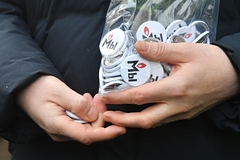The West condemned the liquidation of the Russian “Memorial” for violating the law on foreign agents

Photo: Mikhail Voskresensky / RIA Novosti
The Russian Supreme Court has liquidated the international historical, educational, charitable and human rights society “Memorial” (recognized in Russia as an NGO-foreign agent) for violating the law on foreign agents, RIA Novosti reported. The West reacted to the liquidation of the organization: world politicians criticized the decision of the Russian court.
Thus, the press secretary of the US State Department Ned Price said that Washington condemns the decree. The Ministry of Foreign Affairs (MFA) of Germany reported that the court's decision is “more than incomprehensible to them and contradicts international obligations in the field of protection of fundamental civil rights.”
We call for an end to attacks on civil society in Russia

Ned Price State Department Press Secretary
In Germany, they believe that such a decision deprives the victims of harassment and repression of the right to vote. The Latvian Foreign Minister also spoke about the liquidation of the center. He switched to Russian, threatened Moscow with God's judgment with the words of the poet Mikhail Lermontov. The minister added that he was outraged by this decision. He was also condemned by the Secretary General of the Council of Europe Maria Peichinovic-Buric.
On November 11, the Prosecutor General's Office sent a demand to liquidate the international organization “Memorial” to the Supreme Court. The reason was the repeated violation of the law on foreign agents. The organization, however, argued that the case was political in nature.
Supreme Court decision
On December 28, the Russian Supreme Court liquidated Memorial. At the meeting, the claim was supported by representatives of the Ministry of Justice and Roskomnadzor. According to a representative of the Ministry of Justice, a number of violations by the organization of Russian legislation are confirmed, while the organization continues to violate the law, which cannot be justified by any other merits. Roskomnadzor also expressed support for the claim filed by the General Prosecutor's Office.
RIA Novosti, citing defense representative Maria Eismont, reported that the court's decision would be appealed. Even before the verdict was announced, activists with posters who were waiting for a court decision near the entrance to the building began to be detained near the Supreme Court in Moscow, reports Telegram-channel SHOT.
International “Memorial” was engaged in research of Soviet repression, rehabilitation of victims and assistance to their families. Human rights “Memorial” – “legal advice, assistance to refugees and political prisoners.” Both structures have been in the register of foreign agents for over five years.
Aleksey Zhafyarov, a spokesman for the Prosecutor General's Office, said that, on the one hand, Memorial speculates on the topic of repression, presenting the USSR as a terrorist state, and on the other hand, it is rehabilitating Nazi criminals guilty of the murders of Soviet citizens. He suggested that someone is paying the organization for attempts to rehabilitate the traitors to their homeland, and that this is the real reason for the “violent rejection” with which the organization disowns the status of a foreign agent.
Dmitriev's case
On December 27, a court in Karelia sentenced the historian Dmitriev, head of the Karelian branch of Memorial, to 15 years in a strict regime colony. The case against Dmitriev was opened at the end of 2016 after the discovery of rusty parts of weapons and pictures of his adopted daughter in his house, who was three, five and six years old in the photo. In 2018, he was acquitted, then the decision was canceled and sentenced to 3.5 years in prison, and in 2020 it was decided to increase the sentence to 13 years. The EU called the verdict unacceptable. This was written on Twitter by the official representative of the European Union's foreign policy Peter Stano.
Yuri Dmitriev became the discoverer of the burials of victims of Stalinist repression in Sandarmokh. He compiled books in memory of victims of repressions in Karelia in the 1930-1940s.

